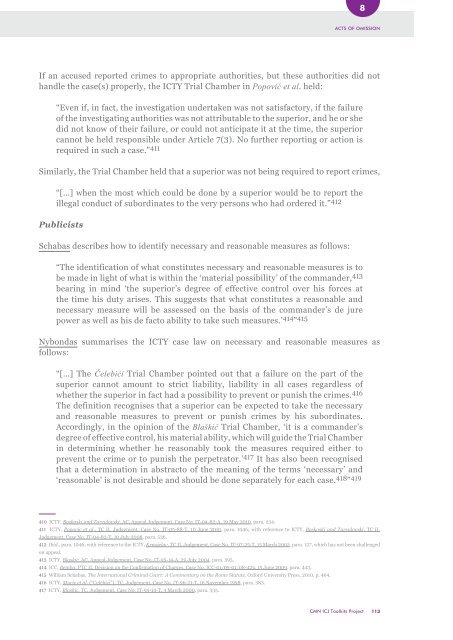Command Responsibility
CMN_ICL_Guidelines_Command_Responsibility_En
CMN_ICL_Guidelines_Command_Responsibility_En
Create successful ePaper yourself
Turn your PDF publications into a flip-book with our unique Google optimized e-Paper software.
8<br />
ACTS OF OMISSION<br />
If an accused reported crimes to appropriate authorities, but these authorities did not<br />
handle the case(s) properly, the ICTY Trial Chamber in Popović et al. held:<br />
“Even if, in fact, the investigation undertaken was not satisfactory, if the failure<br />
of the investigating authorities was not attributable to the superior, and he or she<br />
did not know of their failure, or could not anticipate it at the time, the superior<br />
cannot be held responsible under Article 7(3). No further reporting or action is<br />
required in such a case.” 411<br />
Similarly, the Trial Chamber held that a superior was not being required to report crimes,<br />
“[…] when the most which could be done by a superior would be to report the<br />
illegal conduct of subordinates to the very persons who had ordered it.” 412<br />
Publicists<br />
Schabas describes how to identify necessary and reasonable measures as follows:<br />
“The identification of what constitutes necessary and reasonable measures is to<br />
be made in light of what is within the ‘material possibility’ of the commander, 413<br />
bearing in mind ‘the superior’s degree of effective control over his forces at<br />
the time his duty arises. This suggests that what constitutes a reasonable and<br />
necessary measure will be assessed on the basis of the commander’s de jure<br />
power as well as his de facto ability to take such measures.’ 414 ” 415<br />
Nybondas summarises the ICTY case law on necessary and reasonable measures as<br />
follows:<br />
“[…] The Čelebići Trial Chamber pointed out that a failure on the part of the<br />
superior cannot amount to strict liability, liability in all cases regardless of<br />
whether the superior in fact had a possibility to prevent or punish the crimes. 416<br />
The definition recognises that a superior can be expected to take the necessary<br />
and reasonable measures to prevent or punish crimes by his subordinates.<br />
Accordingly, in the opinion of the Blaškić Trial Chamber, ‘it is a commander’s<br />
degree of effective control, his material ability, which will guide the Trial Chamber<br />
in determining whether he reasonably took the measures required either to<br />
prevent the crime or to punish the perpetrator.’ 417 It has also been recognised<br />
that a determination in abstracto of the meaning of the terms ‘necessary’ and<br />
‘reasonable’ is not desirable and should be done separately for each case. 418 ” 419<br />
410 ICTY, Boskoski and Tarculovski, AC, Appeal Judgement, Case No. IT-04-82-A, 19 May 2010, para. 234.<br />
411 ICTY, Popovic et al., TC II, Judgement, Case No. IT-05-88-T, 10 June 2010, para. 1046; with reference to ICTY, Boskoski and Tarculovski, TC II,<br />
Judgement, Case No. IT-04-82-T, 10 July 2008, para. 536.<br />
412 Ibid., para. 1046; with reference to the ICTY, Krnojelac, TC II, Judgement, Case No. IT-97-25-T, 15 March 2002, para. 127, which has not been challenged<br />
on appeal.<br />
413 ICTY, Blaskic, AC, Appeal Judgement, Case No. IT-95-14-A, 29 July 2004, para. 395.<br />
414 ICC, Bemba, PTC II, Decision on the Confirmation of Charges, Case No. ICC-01/05-01/08-424, 15 June 2009, para. 443.<br />
415 William Schabas, The International Criminal Court: A Commentary on the Rome Statute, Oxford University Press, 2010, p. 464.<br />
416 ICTY, Mucic et al. (“Celebici”), TC, Judgement, Case No. IT-96-21-T, 16 November 1998, para. 383.<br />
417 ICTY, Blaskic, TC, Judgement, Case No. IT-95-14-T, 3 March 2000, para. 335.<br />
CMN ICJ Toolkits Project<br />
113


